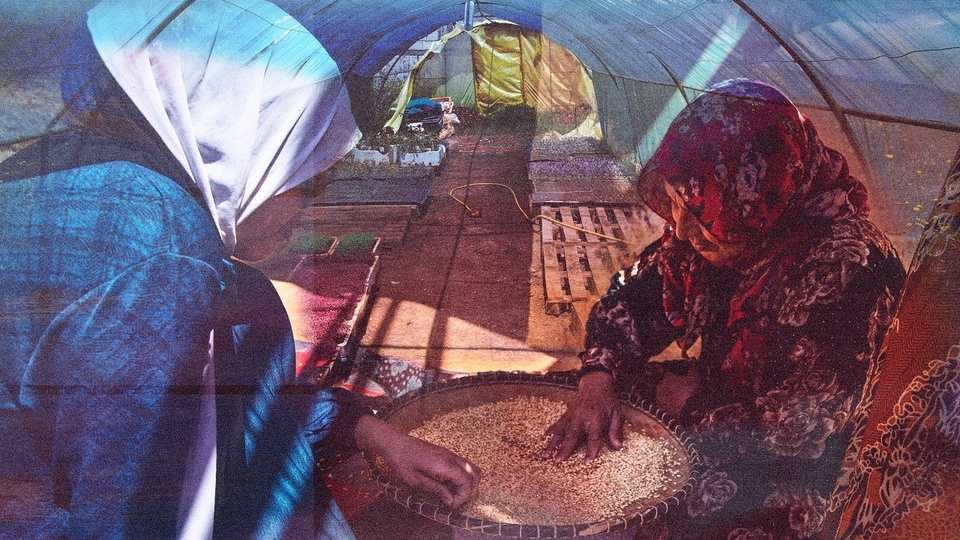From the Ground Up: Seed Saving and Food Sovereignty in Lebanon
Among Lebanon's beloved baladi produce are banadoura jabaliyye, a type of tomato once grown in the mountains, loubia hammaniyya, a bean historically cultivated in the town of Hammana, and Salamouni onions, historically cultivated in the Beqaa villages of Saghbine and Ain Zebdeh.
These varieties are classics of Lebanese cuisine but are exceptional examples of a once wider range of heirloom foods that are now hard to find in Lebanon. Like in the rest of the world, many of the plant species and varieties that fed the generations before us are being lost.
Faced with depleting biodiversity, and in the name of food sovereignty, farmers across the country have begun collaborating to save and share local and regional seeds.
One example is Seed in a Box, a collective with a farm in Beddawi, just north of Tripoli, that coordinates a seed saving and sharing network between 25 small farmers from across Lebanon.
Another is SOILS Permaculture Association, which runs seed saving workshops with farmers in Saidoun, in southern Lebanon.
The Buzuruna Juzuruna (Our Seeds Our Roots) collective has a storage room in its farm in Saadnayel, in the Beqaa Valley, filled with boxes and boxes of heirloom seeds, sourced from across the Levant, Iraq, and Europe.
In conversation, the founders realized “the need to be sovereign… in the production of seeds, in order to have the whole line of production of crops be independent,” Serge Harfouche, a member of Buzuruna Juzuruna, explains.
Through these seed saving initiatives, Lebanese farmers join local communities around the world in working towards “seed sovereignty,” a set of practices that involve reclaiming seeds as a commons and public good, allowing farmers the right to breed, exchange, and save seeds that are not patented, genetically modified, or controlled by corporate monopolies.
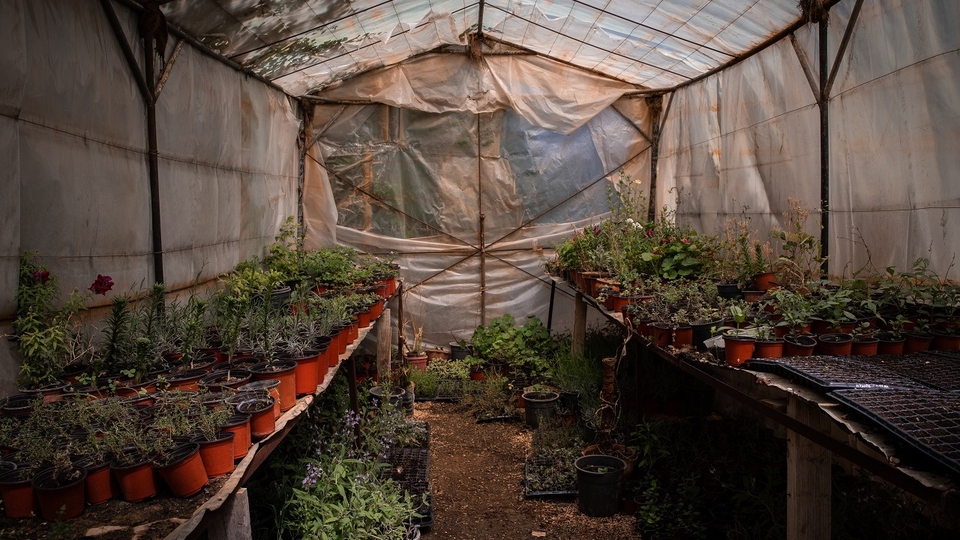
A seedlings greenhouse for flowers and aromatics at the Buzuruna Juzuruna farm in Saadnayel, Lebanon. Their seed bank got its start from European, Iraqi, and Syrian seeds brought from abroad, and has been expanding by collecting seeds from around Lebanon, the Mediterranean region, and elsewhere. Saadnayel, Lebanon. May 10, 2022. (Chris Trinh/The Public Source)
By linking seed sovereignty to food sovereignty, these initiatives are participating in a bottom-up attempt to center the daily practices, struggles, and knowledge of agricultural workers and Indigenous peoples in food production systems — in opposition to the dominant paradigm through which food production and distribution is controlled by a few corporate entities.
These strides towards food sovereignty are particularly vital in Lebanon, as the country is a net importer of food and is therefore extremely vulnerable to global supply chain bottlenecks.
Investing in local cultivation of grains could help lessen the impact of global events like the war in Ukraine, which has disrupted the distribution of cereals from the Black Sea breadbasket. As of 2020, 96 percent of Lebanon’s grain imports came from Russia and Ukraine.
Sovereignty Starts at the Seed
The global market for commercial agriculture is dominated by genetically-modified (GMO) and F1 hybrid seeds, or seeds that have been selectively bred by cross pollinating two different parent plants. These types of seeds have been associated with increased yield and productivity in intensive agricultural systems that depend on irrigation and agrochemicals.
F1 hybrid seeds are artificially bred and produced by four main conglomerates, while up to 90 percent of industrial grain is produced by another four conglomerates. “[These corporations] control food production through seed production,” Harfouche explains.
Because F1 hybrid seeds are made to produce only one yield and are therefore not reproducible in successive generations, they are not appropriate for seed saving; if farmers extract seeds from their F1 harvests to reclaim and clean the seeds for replanting, they will produce poor quality harvests or none at all.
Moreover, corporations have patented seeds so that farmers are not legally allowed to replant seeds containing “proprietary” genetic material. Farmers around the world have been sued by multinationals for patent infringement, even when F1 or GMO crops make their way into fields planted with non-GMO or F1 varieties, due to natural cross-pollination of crops. Corporations often also contractually prevent farmers who are their customers from saving, sharing, and selling seeds.
“The beauty of heirloom seeds is that no one owns them — it’s masha‘, it’s the commons.”
—Serge Harfouche, Buzuruna Juzuruna
As a result, if they want to continue to grow the same high-yield crops, farmers must re-buy seeds from these corporate seed monopolies every planting season, trapping them in a cycle of dependency.
In contrast, heirloom seeds are open-pollinated and reproducible, which means the seeds from one generation to the next can be replanted to successfully yield another harvest the next season.
“In order to reach food sovereignty, the solution … is to free the seeds and keep them fertile (non-GMO, not F1) and produce local bio and natural fertilizers to manage the pests,” Sara Salloum and Bashar Abu Saifan, co-founders of Seed in a Box, tell The Public Source.
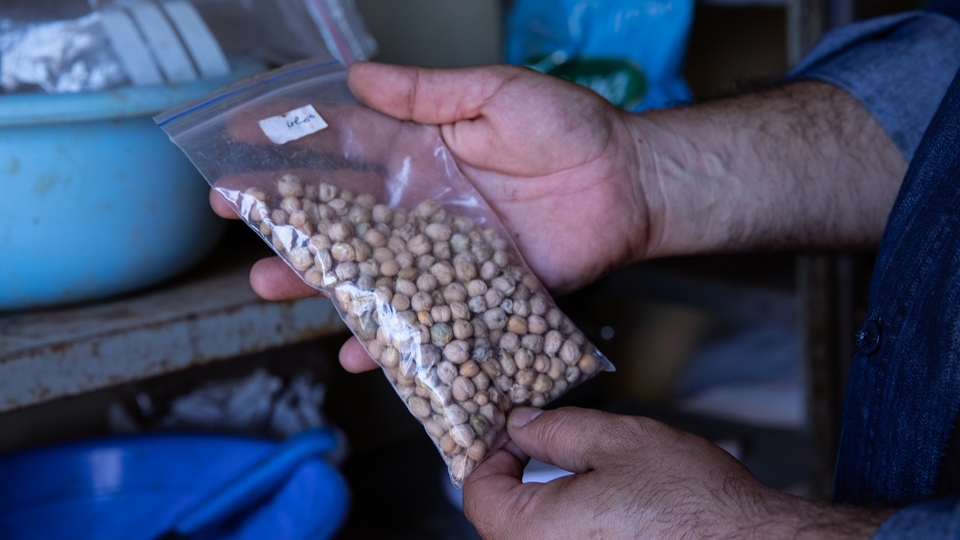
Bashar Abu Saifan holds a bag of chickpeas grown and saved for seed on the Seed in a Box land in Beddawi, Lebanon. May 18, 2022. (Chris Trinh/The Public Source)
“As a practical solution we decided to start heirloom seed saving by growing them each season with a network of farmers,” Salloum and Abu Saifan add.
“The beauty of heirloom seeds is that no one owns them — it’s masha‘, it’s the commons,” says Harfouche.
Taking seeds out of the hands of proprietary business and putting them into the hands of everyday farmers is a fundamental pillar of food sovereignty; open-access heirloom seeds can “‘travel’ and be produced elsewhere without being controlled by anyone,” Harfouche explains.
If they want to continue to grow the same high-yield crops, farmers must re-buy seeds from corporate seed monopolies every planting season, trapping them in a cycle of dependency.
Alongside seed storage for safe-keeping, another way to preserve and sustain the lineages of seeds is by growing and harvesting them each season. Seed in a Box grows and harvests heirloom varieties of legumes, vegetables, and fruit trees each season — maintaining a “living library” of heirloom seeds, which allows the seed to adapt, evolve, and remain in circulation amongst the community.
For example, before planting season Seed in a Box might give a farmer 40 kilograms of chickpeas at no cost and then ask for 50 kilograms of the same seed in return at the end of the season, to then distribute the seeds to more farmers. According to Abu Saifan, crops like beans, in the right growing conditions, can give you a 20-fold return on the seeds. Thus, asking for a higher volume in exchange for free heirloom seeds is not a large burden to the farmer, reduces the start-up costs of the F1 to heirloom seed transition, and is a way to maintain the seed supply within Seed in a Box’s farmer network.
Any small farmer who is willing to exchange and grow the seeds can join the network, as Seed in a Box relies on farmers to collect/exchange seeds, as well as local and international seed banks.
In order to partially fund their farmer seeds exchange program — which allows them to provide farmers with seeds, free of cost — Seed in a Box sells their heirloom seeds to hobbyists/non-professional farmers, explains Abu Saifan.
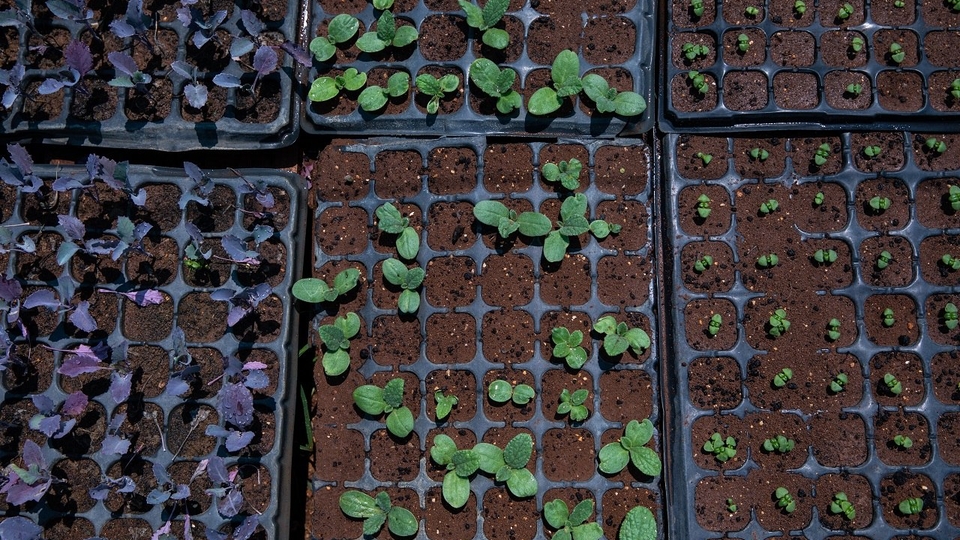
Vegetable seedlings in a Seed in a Box greenhouse in Beddawi, Lebanon. May 18, 2022. (Chris Trinh/The Public Source)
Buzuruna Juzuruna’s seed catalog changes every season and is available online. Seeds are selected primarily based on their ability to resist drought, disease, and pests, as well as their ability to adapt to changes in weather, soil, and fertilization. Secondary selection criteria include taste, nutritional value, shape, and susceptibility to rot.
A key part of Buzuruna Juzuruna’s heirloom seeds initiative is the establishment of a seed production network, so that small-scale production of heirloom seeds is distributed across as many farms as possible, on a national scale. So far, the network includes six farms in Metn, Kesserwan-Jbeil, Saadnayel, and Baalbek.
“The idea is to eventually, as an association, become obsolete,” Harfouche says of Buzuruna Juzuruna. “If there is production of local heirloom seeds in every part of this country, there is no need for an association doing that work.”
The seed production network has begun seeing practical developments on the ground. Yara Ward is one of the farmers participating in Buzuruna Juzuruna’s seed production network and is currently in her third season of planting. Ward is based in Kfardebian and has recently begun an heirloom seed cultivation project in collaboration with five other farmers.
“Sovereignty starts at the seed,” says Ward of the project.
One key type of heirloom seed distributed in Lebanon's seed saving networks are cereals such as wheat, rye, sorghum, or quinoa — critical because they are globally used as flour for staple food items such as bread, but in the Levant also for freekeh and burghul.
Some of the local wheat varieties that Seed in a Box and Buzuruna Juzuruna distribute are Black Beard, an Iraqi hard wheat; Salamouni, a Lebanese wheat variety; Dhaybe and Hommariyya, both soft wheats from Syria; Hraydini, an old Lebanese hard wheat once grown in the mountains; and Einkorn wheat, an ancient Fertile Crescent wheat variety.
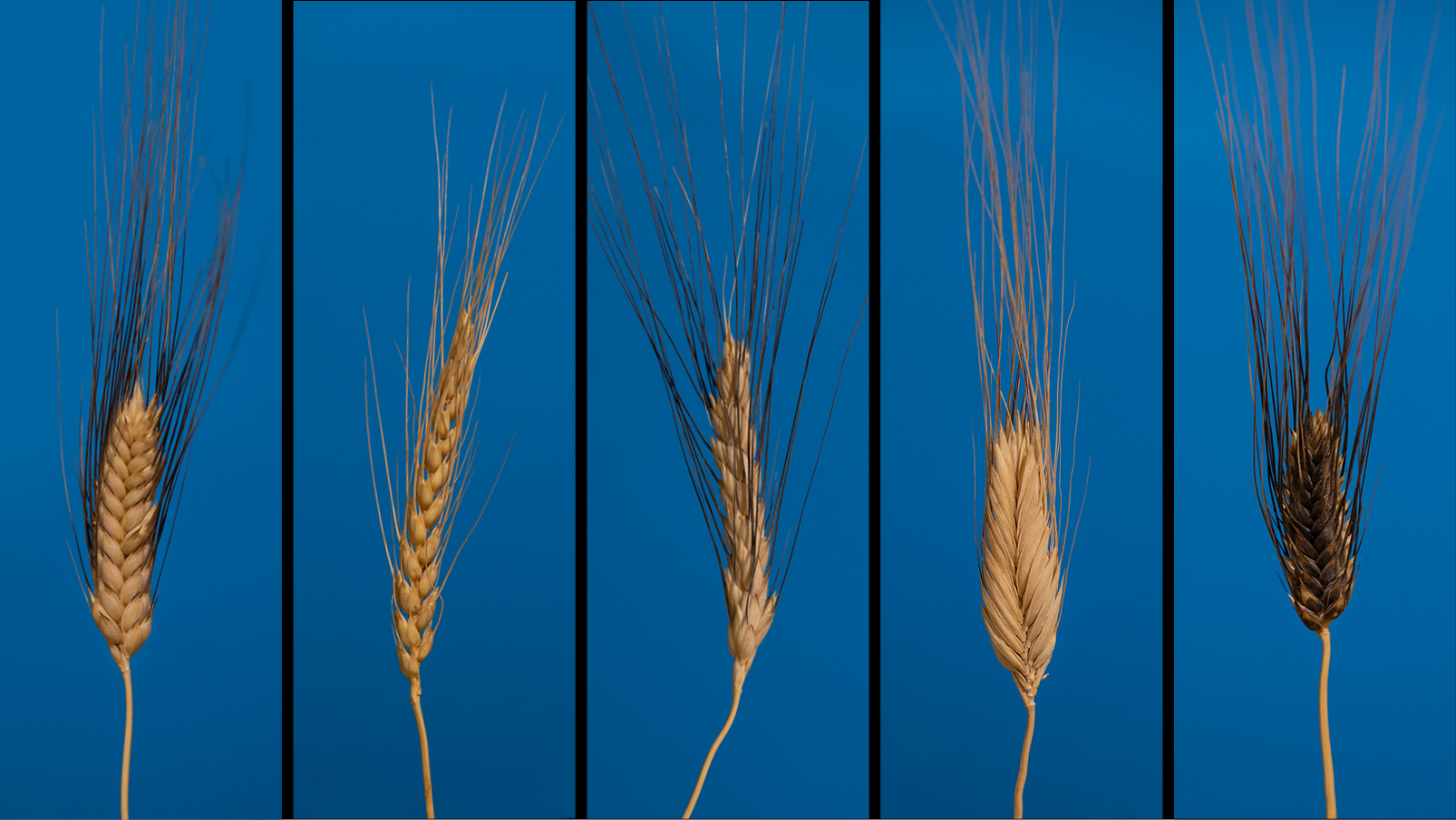
A collage of different heads of heirloom wheat varieties found in Lebanon, Palestine, and Iraq. May 2022. (Chris Trinh/The Public Source)
Farmers who cultivate these varieties are saving them from extinction. For instance, the Iraqi Black Beard was almost lost after US forces bombed a seedbank in Iraq during the 2003 invasion. Every new generation of heirloom seeds further adapts to the land in which it is grown. By cultivating, saving, distributing, and replanting these age-old strains over successive harvests, their generational ecological resilience is preserved as a living genetic entity.
From Seed to Food Sovereignty
With their emphasis on heirloom seed distribution, a pillar of the food sovereignty movement, and also on developing locally produced farming inputs such as compost (used for fertilizer) and biopesticides, Seed in a Box and Buzuruna Juzuruna are part of a burgeoning food sovereignty movement in Lebanon and the wider SWANA region.
Food sovereignty arose out of the organizing principles of peasants’ rights movements in Latin America, when rural farmers began to challenge the negative impacts of import-based diets and corporate control over food production, Rami Zurayk, a professor of Ecosystem Management at the American University of Beirut, tells The Public Source.
Zurayk adds that the industrialization of food production has “systematically destroyed indigenous food systems and agriculture,” and also drives people “toward modes of dietary consumption out of tune with their ecology, environment, culture, society, or economics.”
The term “food sovereignty” became formalized with the establishment in 1993 of La Via Campesina (Spanish for The Farmer’s Way), an international farmers network with chapters on almost every continent, that advocates for the rights of food producers, agricultural workers, indigenous peoples, fisherfolk and other actors in the food system.
Zurayk summarized Via Campesina’s working definition of food sovereignty as “the right of people to decide their food systems, and their farming systems, and what they produce, and what they eat.”
By linking seed sovereignty to food sovereignty, these initiatives are participating in a bottom-up attempt to center the daily practices, struggles, and knowledge of agricultural workers and Indigenous peoples in food production systems.
According to Heather Kayed, a food systems researcher based in Lebanon, the first policy usages of the term “food sovereignty” by the United Nations Food and Agriculture Organization (FAO) in the 1990s “really emphasized the role of the nation-state.”
However today, the global food sovereignty movement transcends the nation-state. In Palestine, where territorial sovereignty is impossible under occupation, the food sovereignty movement “serves as a mobilizing power and force in order to oppose oppression and subjugation,” Zurayk says. Another way to conceptualize sovereignty outside of manmade borders would be to think in terms of a “landscape approach,” said Kayed, where sovereignty is advocated for in the context of an ecological territory or planting biome.
Kayed says that food sovereignty can also be a framework to “talk about power relations in the food system” and that food sovereignty is something to be communally defined. Within Lebanon’s food system, there are strict hierarchies along lines of geographic origins, gender, and access to markets. While most farmers are men, Kayed points out that the day laborers who harvest and weed Lebanon’s fields are mostly Syrian women.
Thus, adds Kayed, the food sovereignty movement, which champions the rights of everyone in the food production chain – from laborers to packers to consumers – in Lebanon is grappling with the question of: how does every actor realize their right to agency and self-determination when such vast power differentials are present?
Opportunities and Challenges to Food Sovereignty in Lebanon
Realizing a resilient, intersectional food sovereignty movement in Lebanon is not without its challenges.
For one, Zurayk explains that initiatives that might consider themselves part of the food sovereignty movement are very “atomized,” and in general, initiatives in Lebanon are “very dependent on NGO—Western NGO—funding.”
Additionally, farmers continue to significantly depend on subsidized imports to grow a harvest each season. Historically, subsidization has rendered it cheaper to grow industrial produce that is often pre-treated and genetically modified, than to buy and grow local seeds, which require more meticulous care, such as sourcing and applying organic fertilizers.
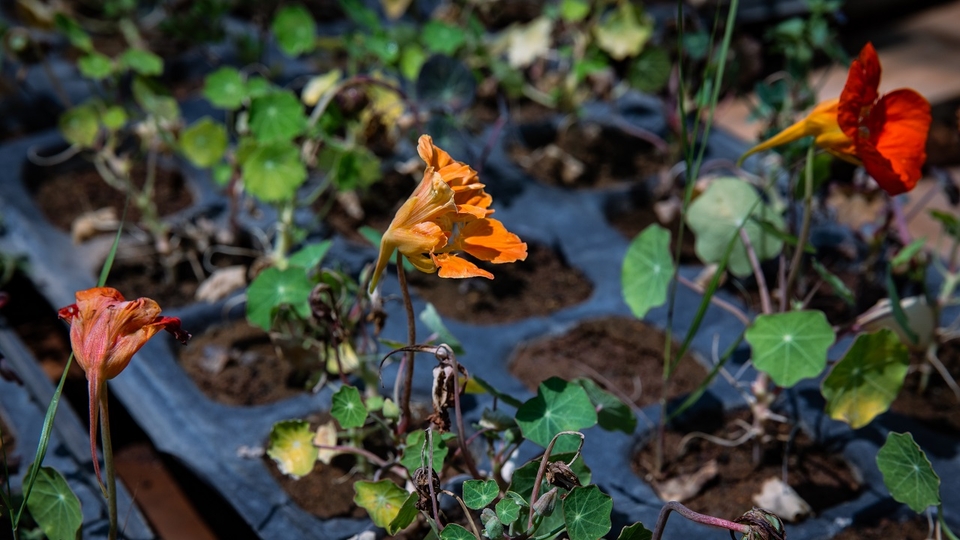
Young Nasturtiums (Tropaeolum majus and minus) in a greenhouse at the Seed in a Box farm in Beddawi, Lebanon, waiting to be transplanted into open soil. Nasturtiums are cultivated on the farm for use as a biopesticide (natural alternatives to potentially toxic chemical pesticides), due to Nasturtium extract's insecticidal properties. Beddawi, Lebanon. May 18, 2022. (Chris Trinh/The Public Source)
But amid Lebanon’s economic crisis, having to use foreign currency (or the equivalent in Lebanese Liras) to purchase seeds and then selling them in the local Lebanese currency leaves farmers at a financial loss due to the depreciated value of the Lebanese Lira.
Though the Lira depreciation theoretically provides an opening for encouraging local seed initiatives, there are other hurdles.
According to a 2021 report by Jibal, the World Food Programme (WFP) has tripled the amount of aid they send to Lebanon since the Beirut port explosion in August 2020. On a national scale, despite the gravity of Lebanon’s food insecurity, the short-term solution that is food aid creates long-term dependency. This inevitably “[stifles] local production and autonomy,” the report says.
Harfouche sees the main factor preventing farmers from transitioning away from hybrid seeds to be the smaller crop yield when first transitioning to heirloom varieties, especially in the context of the economic crisis, when farmers cannot risk their income.
“What [farmers] are afraid of is that the productivity won’t be the same,” Hanna Mikhael, an agricultural engineer with Jibal adds. Big agriculture corporations capitalize on this fear to heavily market F1 seeds.
Where an amount of F1 hybrid seeds would produce 8 to 9 kilograms of tomatoes, Mikhael illustrates, the same amount of heirloom seeds would initially only produce 4.5 to 5 kilograms, costing farmers a significant amount.
This is because F1 hybrid seeds are engineered to be grown in monoculture systems with chemical fertilizers and chemical pesticides as additive inputs, which artificially increase yield. However, industrial agricultural practices such as these damage soil, insect biodiversity, and human health in the long term. In contrast, agroecology and permaculture, farming methods which mimic natural ecosystems and rest on multi-crop planting, are better for the environment, maintain soil health, and can also lead to high yields, but take time to transition into.
Additionally, farmers often decide what to plant based on what they can sell. However, sales often rest on the arbitrary prices decided by middlemen, as “in Lebanon, the primary way for farmers to sell fresh produce is to go through the wholesale market system. Currently, there are seven large and two small wholesale markets, covering production regions from North to South,” wrote Kayed and her co-authors in the Jibal report.
Middlemen govern farmers’ access to the wholesale market, and quantity is often prioritized over quality.
“The prices of our produce are not up to us. As soon as business moved to the city, it was no longer in our hands. The middleman buys and sells depending on demand and the market.” – Kassem El Zo‘obi, Saadnayel farmer
Even if a farmer is interested in planting different crops, they will most likely plant what seems marketable in the wholesale system; type of crop, quantity, and price are determined by predicted consumer demand, which is determined by middlemen. This decision-making process makes farmers dependent on the whims of the middlemen and the wholesale market rather than leaving them agency to decide what to plant and how to price it.
Kassem El Zo‘obi, a farmer born and raised in Saadnayel, Lebanon, has been farming his whole life and recently began the transition to using organic fertilizers instead of chemicals. He and his neighbors are also susceptible to fluctuating demand in the wholesale market. He says they no longer try to sell their harvests in the Beqaa area and instead have to pay transportation to get their produce to wholesale markets in Beirut.
“The prices of our produce are not up to us. As soon as business moved to the city, it was no longer in our hands,” Zo‘obi explains. “The middleman buys and sells depending on demand and the market.”
“We send him the produce and he sends the profit back to us every week with a driver.”
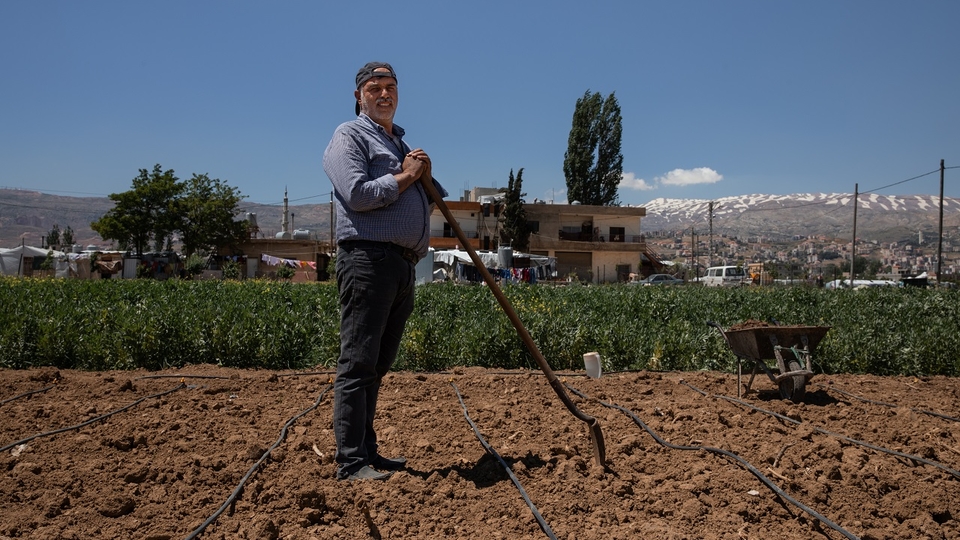
Kassem El Zo‘obi, born and raised in Saadnayel, Lebanon, adds manure to his field as a natural fertilizer. El Zo‘obi, who grows fava beans, tomatoes, peppers and other vegetables, is in the process of converting from industrial agricultural methods to organic, using heirloom seeds. Saadnayel, Lebanon. May 10, 2022. (Chris Trinh/The Public Source)
Many of the small farmers in Seed in a Box’s network face the same challenges as El Zo‘obi. After lengthy discussions to determine the roots of their agricultural problems, Seed in a Box co-founders Sara Salloum and Bashar Abu Saifan concluded that “the main issue was, and is still to date, the debt that is leeching [from] the farmer and pushing [them] toward practices that harms their lives and the environment.”
“It is the same story with every small and medium farmer on this globe who is forced to sell their labor under a very low price and generate profit to transnational companies and their local agencies and chemical fertilizers companies,” Salloum and Abu Saifan add.
Attaining food sovereignty will eventually necessitate breaking out of the monopolization of corporate food and seed production — as well as the customs of work and treatment between and among farmers, brought about by conventional agriculture.
“In the past 50 years or so, conventional agriculture has imposed … a top-down, hierarchical, controlled-by-the-few approach,” Harfouche says. “And the mass that actually does the work is paid [extremely little].”
A food sovereignty approach, despite the challenges of implementation, offers a blueprint for a path out of crisis for Lebanon’s food system; crisis is an opportunity to reimagine our relationship with food and the means through which we produce it.
In this context, Lebanon’s burgeoning seed saving initiatives are a first step towards breaking free of the shackles that bind the Lebanese agricultural scene to corporate food production and the dependence brought on by the crisis.
As Harfouche puts it: “The value [of our work] is just in showing that another way is possible.”
